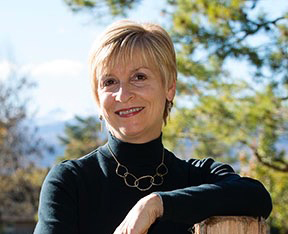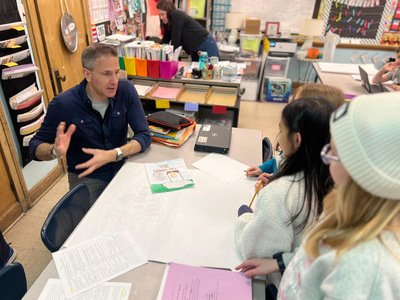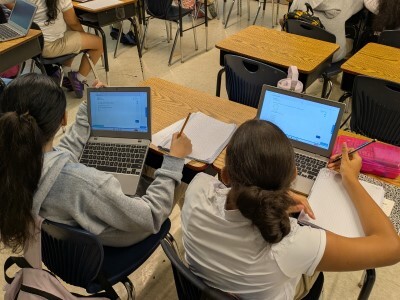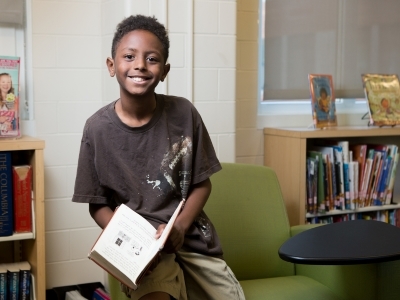Student Travelers Experience the World to Know Themselves
Topics
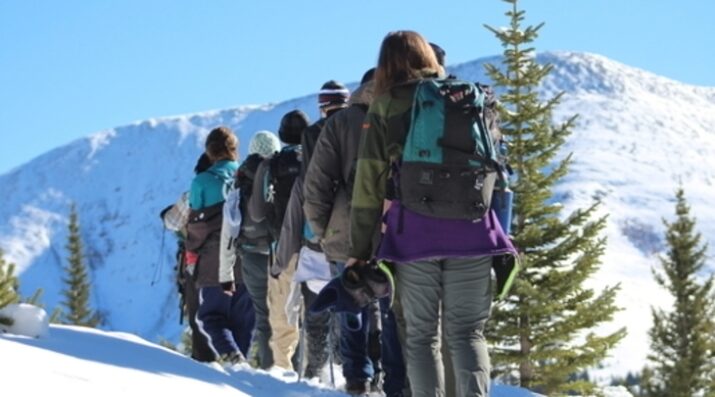
We’ve all had the experience of truly purposeful, authentic learning and know how valuable it is. Educators are taking the best of what we know about learning, student support, effective instruction, and interpersonal skill-building to completely reimagine schools so that students experience that kind of purposeful learning all day, every day.
Practitioner’s Guide to Next Gen Learning
A Colorado public K-12 school's experiential learning program provides all learners with transformative travel experiences.
Life is either a daring adventure or nothing at all.
—Helen Keller
In December 2018, Next Generation Learning Challenges (NGLC) facilitated a Learning Excursion, with funding from the Barr Foundation, for a group of Massachusetts educators to visit innovative schools in Colorado. One of the highlights of the school visit to Jefferson County Open School, an unconventional public K-12 school in Lakewood, was listening to our student hosts talk about the experiential program and seeing examples of student-written transcripts. These substantial narratives—some of them 40 pages long—describe and document each graduate's learning and growth over the years.
Visitors to the school asked many questions about the transcripts and the projects and other learning experiences they contained, but one aspect of the Open School's program that amazed our group was the number of trips students took. Students' photos and reflections told stories of treasure hunting in Yellowstone National Park, visiting Selma, Ala., to commemorate the 1965 march for civil rights, participating in an archeological dig on a Navajo reservation, and painting with watercolors in New Mexico.
Though our adult and student hosts graciously fielded the questions we pelted them with, my fellow educators and I came away wanting to know much more. So for this edition of Friday Focus: Practitioner's Guide to Next Gen Learning, I followed up with Scott Bain, the principal of the Open School, and students Nils Aberg and Eva Shimanski in order to find out:
- Why is travel such an integral part of your mission and goals for students?
- What does it look like in practice?
- How do you ensure that travel is accessible to all students?
- What lessons have you learned from your decades of experience?
The "Why" of Student Travel
Those of us who have ever organized a field trip have at least an inkling of the work required to organize and execute experiences like a weeklong river-rafting expedition or a community-service trip to Central America. However, according to Scott, there are many compelling reasons to devote the time and effort. When I asked him why travel was so important to the Open School, he answered at length and with obvious enthusiasm.
Some of the reasons might be what you'd expect, like connecting learners with people they would not usually meet or supporting them to try new things. However, according to both Scott and the students, the benefits of travel go much deeper. Many learners refer to these trips as turning points in their lives, experiences of profound self-discovery. When describing the purpose and design of travel at the Open School, Scott talks about "taking risks, building self-reliance, and overcoming self-imposed barriers—emotional, social, and physical. Kids learn how to overcome failure and learn from mistakes." He provides a typical example from camping in the wilderness: "If you just burned the dinner, you better figure out some solutions."
In this way, Scott says, students discover new aspects of themselves that they can draw on as they meet other challenges. As he explains, "Students who are not rock stars in the classroom have the opportunity to learn and practice leadership and develop new competencies. This creates success to build upon and a metaphor to return to throughout the years. It's something you can lean in on when you talk to them about academics. When they say, 'I can't do math,' you can remind them about the trepidation they once felt about being outdoors."
Scott reports that in addition to teaching young people about themselves, these trips strengthen relationship skills and a sense of community. Nils and Eva both describe the Wilderness Trip, a four-day backpacking trip in the Mt. Evans Wilderness Area, as especially powerful. To Nils, it is "one of the most important aspects of the high school program at the Open School. Each student is required to complete this trip in order to graduate, so it is a shared experience that binds all former graduates and current students together." As for connecting with adults, Scott explains, "When you are all sleeping on the same ground, there is no hierarchy. Advisers get to know kids better in four days than in a semester in the classroom."
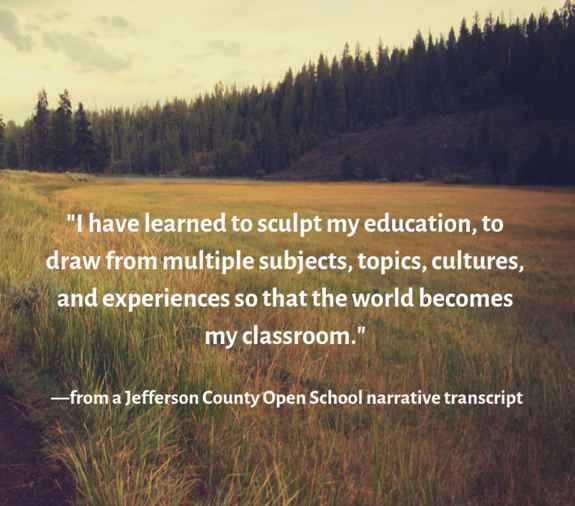
Think Travel, Not Tourism
Preplanned travel doesn't always respect environments that it utilizes and is more focused around making money. We are more focused on learning and leaving a positive impact.
—Nils Aberg, Jefferson County Open School student and traveler
Other than some river trips, which can require a guide, the Open School takes a do-it-yourself approach to designing and leading the travel experiences. It is more work for the school, but Scott, Nils, and Eva all advocate organizing your own trips for several reasons.
One of these is to shape the experiences so that they align well with the school's mission, the curriculum, and the learners' goals. At the Open School, whether travel is the culminating experience for a year of learning and research, a hurricane relief trip to New Orleans, or a student-designed Passage experience en route to adulthood, it is definitely not tourism. Scott reports that prospective families are told, "If you are looking for a vacation, this is the wrong school for that."
Traveling this way changes the nature of the interactions as well, he points out. "If you don't hire a company that sells trips, it's almost shocking how people will open doors and reach out in ways they don't do for 'tourists' who arrive in a chartered bus. They view you differently."
As an example, Scott shares a story from a trip to Belfast, Northern Ireland, the capstone experience for a political science course on the sectarian conflict of the late 20th century. One day, when the students were taking a break at a tea shop, they were approached by a group of women working on a new museum that explored the role of women in the Irish Republican Army. Even though the museum's doors were not yet open to the public, the Open School students were invited in to see it.
According to Scott, another advantage of running your own travel program is the opportunity to form relationships with people who live and work in the places you visit. "It's all about relationships," he says. "That's paramount for learning, and it's what makes these trips matter and succeed beyond our expectations." He recommends that school communities cultivate relationships with "people who are passionate, brilliant, and willing to share." It takes work to find them, he acknowledges, but it is worth the effort.
Over the years, the Open School has forged many long-term friendships, like the 20-year partnership with author, guide, and former park ranger Fred Blackburn in southwest Colorado or the as-yet unknown street artist students met in Los Angeles a few years ago. Scott notes that the artist is now successful and has his own gallery, yet he still takes the Open School students on a tour of buildings and murals. "That guy is not going to do that with a chartered trip," he argues.
The reciprocal and mindful nature of these relationships, Nils points out, is also a defining characteristic of the trips. "The Open School tries as hard as possible to stay away from negative relationships and impacts. Some people who travel with good intentions unknowingly influence issues and create dependencies. We try to be conscious about what kind of service we do, what kinds of industries we support, and how we impact the places we visit. We learn as much as we can and give back to the people who allow us to have this experience."
A final consideration they all highlight is cost, which they tie to equity and accessibility. According to Scott, students and their families are informed very early on that travel is a priority at this public school, and that money that would pay for sports at another school is diverted to defray the cost of travel. The school owns minibuses, Suburbans, portable kitchens, and tents. The students and staff travel by car, stay in people's homes or church basements, and camp whenever possible. Instead of going out to restaurants, Scott describes how they shop in grocery stores, eating oatmeal and PBJ's, to keep meals under $10 per day per person. "Spaghetti is an extravagance," he says with a smile.
According to the students, this trade-off is worth it. "Traveling through companies who plan trips would increase the cost of the trips to an amount that wouldn't cater to all students as they should," says Nils. "Equal opportunity is part of what makes the trips fun and diverse." He recalls, for example, that his 17-day service trip to Nicaragua—including airfare, meals, accommodations, and ground transportation—cost only $900.
Moreover, that figure represents the price before all the fundraising with activities like the "zombie dash" organized by the Parent/Teacher/Student Organization (PTSO) and the annual talent show. In addition, the Open School offers donation-funded grants, which are paid off through community-service hours and needs-based scholarships.
Staff members also pay for their own trips, which is part of the school's tradition. "It might not work at other schools," Scott acknowledges, "but teachers see themselves as learners, and they see it as an equity issue. If a kid is taking on a minimum-wage job to pay for a teacher to go on a trip, it's just not equitable." Eva expresses her appreciation for all the work the adults do in this way: "Practically every teacher at the Open School should also be able to put travel agent on their resume because of the time they spend working through travel itineraries to find the best yet most inexpensive way to reach our destination."
Some Advice Before You Embark
Jefferson County Open School has almost 50 years of experience with supporting learners to see the world as their classroom, and Scott and the students offer to the field some additional learning the school has gleaned over the years.
Organize multiage trips (at least some of the time) to support built-in mentoring and peer-to-peer culture building. On a recent middle and high school river trip through Boquillas Canyon in southern Texas, for example, Scott saw "lots of mentoring around how to set up camp along the river, how to organize your gear, lots of problem-solving."
Don't shy away from longer trips. According to Scott, eight days is optimal, "because you will definitely run into conflicts and you have to learn how to work through them." Nils agrees. "All extended travel experiences have difficult moments," he observes, "and students can learn how to resolve conflicts and stay flexible in these situations."
Leave the devices at home. Eva admits that, "No electronics is something that I personally struggle with but also absolutely love. I am addicted to my cellphone, like any teenager. But leaving my phone for weeks at a time is so amazing. I am less stressed; my anxiety and depression go down, and I feel better. It makes the experience so much more authentic. Students really spend time interacting with one another. We get to know each other so much better than we would with cellphones in front of our faces."
Hire with travel in mind. Consider the kinds of skills needed for designing and implementing travel experiences when you build your staff. Scott explains, "On resumes I am looking for people who have had to create experiences and not just deliver them. For example, teachers may have served in the Peace Corps, led trips for Outward Bound, or worked as river guides."
Co-design the travel experiences with learners. "When students plan their own trips and put effort into the experience itself," Nils says, "they appreciate being out and about more. Since each participant can give input to organize the activities on the trip, they are more enthusiastic and they can enjoy what they have created."
Be intentional about building learners' self-reliance. Scott notes that, in his experience, students often look to adults to solve their problems or ask questions that they can find answers to on their own or from an experienced peer. To promote self-reliance, he says, "teachers at the Open School are adept at getting students to find solutions. At first, students may wonder, 'Can I take care of myself?,' but at the Open School we talk a lot about the satisfaction they feel when they can answer 'yes!'"
Resources
- This student-facing Description of the Six Passages presents and explains the six projects all Open School students complete in high school. One of these, the "Adventure Passage," involves a personal quest patterned after the hero's journey. For many it takes the form of a self-directed trip.
- "Advising Group at Jefferson County Open School," one of five case studies included in Springpoint's Designing Advisory Systems, highlights the ways wilderness trips help develop learners' self-reliance, forge strong relationships, and serve as a "disorientation" experience about what learning will look like at the Open School.
- This article from the Lakewood Sentinel features the journey the Open School's Black American History class took to Selma, Ala., to celebrate the 50th anniversary of the Voting Rights March.
- Under the title "A high school that refuses to conform to standardization," The Washington Post profiles the Open School for its unique vision of engaging, relevant, learner-centered education, including the role travel plays in the student experience.
Images, from top:
- Open School students hike Quandary Peak, one of Colorado's "fourteeners." (Photo courtesy of Nils Aberg.)
- An excerpt from one Open School graduate's narrative transcript. (Graphic courtesy of Amanda Avallone.)

